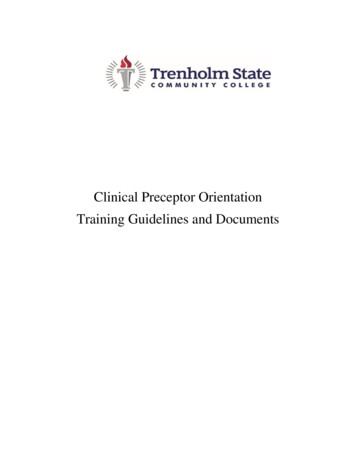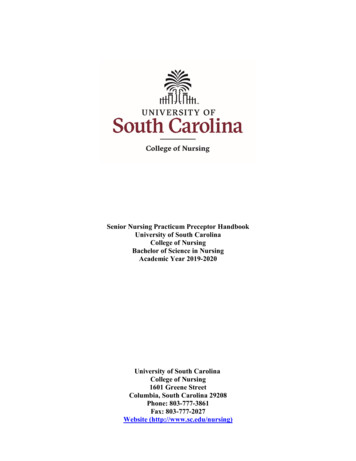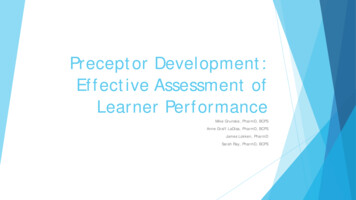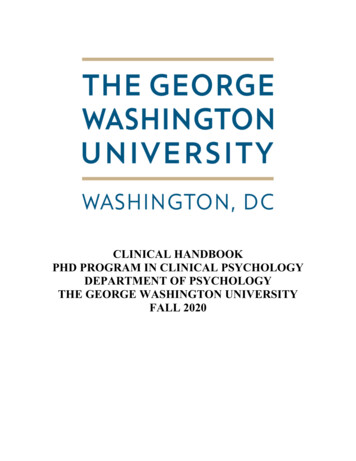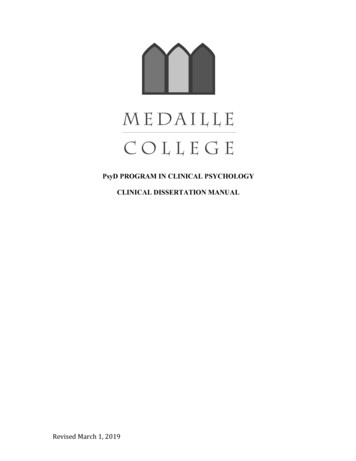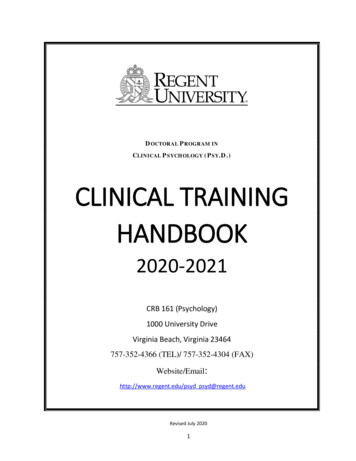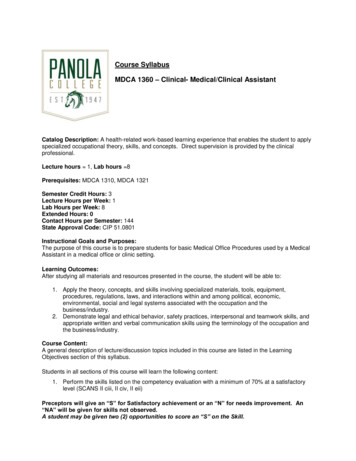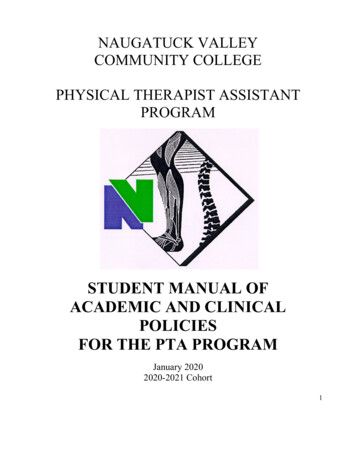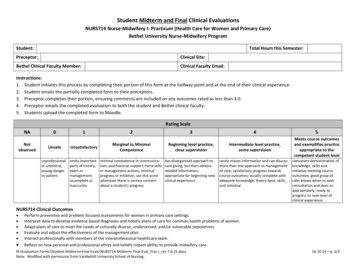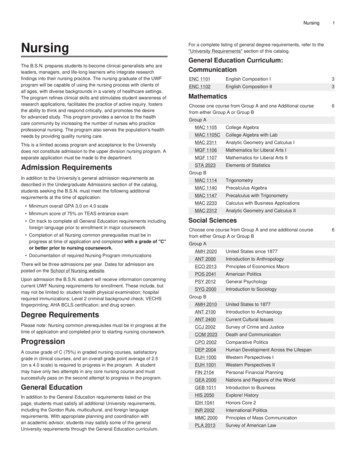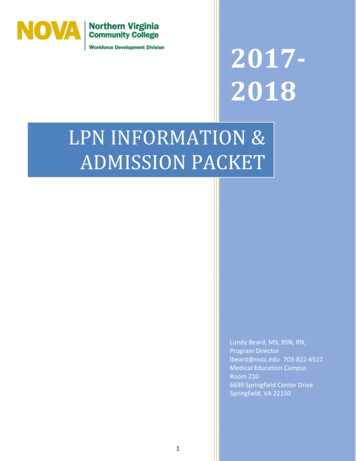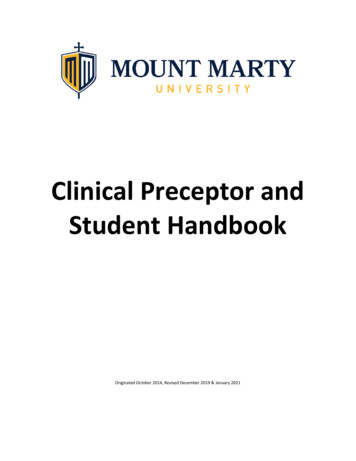
Transcription
Clinical Preceptor andStudent HandbookOriginated October 2014, Revised December 2019 & January 2021
Mount Marty University Graduate Nursing ProgramPart A - Introduction, Mission, Goals, and OutcomesIntroductionThe Mount Marty University Graduate Nursing Program prepares students for advanced practice as a Family NursePractitioner (FNP) or Psychiatric Mental Health Nurse Practitioner (PMHNP). The standard, full-time course of study for theFamily Nurse Practitioner Program is 50 credits including 720 supervised, direct patient care clinical hours. The PsychiatricMental Health Nurse Practitioner Program is 50 credits including 660 supervised, direct patient care clinical hours. Plans ofstudy may be individualized for part-time, transfer or post-graduate APRN certificate students.Courses shared by FNP and PMHNP students:NSG 500 Advanced Practice Roles and LeadershipNSG 503 Advanced Pharmacology Across the LifespanNSG 504 Advanced Pathophysiology Across the LifespanNSG 502 Advanced Physical Assessment Across the LifespanNSG 506 Inquiry INSG 550 Advanced Practice in Care of FamiliesNSG 507 Legal/Ethical/Political Issues for APNsNSG 514 Inquiry II*FNP specific courses:NSG 570 Advanced Concepts in Care of Older Adults*NSG 571 Advanced Concepts in Care of Older Adults Practicum*NSG 572 Advanced Concepts in Care of Women and Children*NSG 573 Advanced Concepts in Care of Women and Children Practicum*NSG 574 Advanced Concepts in Care of Rural & Vulnerable Populations*NSG 575 Advanced Concepts in Care of Rural & Vulnerable Populations Practicum*NSG 576 Advanced Concepts in Care of Adults*NSG 577 Advanced Concepts in Care of Adults Practicum*PMHNP specific courses:NSG 560 Neuroscience for PMHNPs*NSG 561 Psychopharmacology*NSG 562 Differential Diagnosis of Mental Health DisordersNSG 563 Psychotherapeutic ModalitiesNSG 564 PMHNP Care of Pediatrics/Families*NSG 565 PMHNP Pediatrics/Families Practicum*NSG 566 PMHNP Care of Adults/Older Adults*NSG 567 PMHNP Care of Adults/Older Adults Practicum** Denotes the course has one or more required pre-requisites or co-requisites
Program of StudyMaster of Science in Nursing – Family Nurse seNumberNSG 500Advanced Practice Roles and Leadership3NSG 503Advanced Pharmacology Across the Lifespan3NSG 504Advanced Pathophysiology Across the Lifespan3NSG 502Advanced Physical Assessment Across the Lifespan4NSG 506Inquiry I3NSG 550Advanced Practice in Care of Families2NSG 507Legal/Ethical/Political Issues for APNs3NSG 570Advanced Concepts in Care of Older Adults3NSG 571Advanced Concepts in Care of Older Adults Practicum3NSG 572Advanced Practice in Care of Women & Children3NSG 573Advanced Concepts in Care of Women & ChildrenPracticumInquiry IIAdvanced Concepts in Care of Rural & VulnerablePopulationsAdvanced Concepts in Care of Rural & VulnerablePopulationsAdvanced Concepts in Care of AdultsAdvanced Concepts in Care of Adults Practicum2NSG 514NSG 574NSG 575SpringNSG 576NSG 577Course NameCreditsTotal Credits and Clinical HoursClinicalHours1801203331803424050720
Program of StudyMaster of Science in Nursing – Psychiatric Mental Health Nurse PractitionerCourseNumberNSG 500Advanced Practice Roles and Leadership3NSG 503Advanced Pharmacology Across the Lifespan3NSG 504Advanced Pathophysiology Across the Lifespan3FallNSG 502NSG 506NSG 550Advanced Physical Assessment Across the LifespanInquiry IAdvanced Practice in Care of Families432SpringNSG 507Legal/Ethical/Political Issues for APNs3NSG 560Neuroscience for PMHNP’s2NSG 561Psychopharmacology2NSG 562Differential Diagnosis of Mental Health Disorders2NSG 563Psychotherapeutic Modalities3NSG 514NSG 564NSG 565Inquiry IIPMHNP Care of Pediatrics/FamiliesPMHNP Pediatric/Families Practicum335NSG 566PMHNP Care of Adult/Older Adults3NSG 567PMHNP Adult/Older Adult urse NameTotal Credits and Clinical Hours4CreditsClinicalHours300
Definition of Advanced Practice Registered Nurse -- Nurse PractitionerTo be recognized as expert health care providers and ensure the highest quality of care, NPs undergorigorous national certification, periodic peer review, clinical outcome evaluations and adhere to a code forethical practices. Self-directed continued learning and professional development is also essential tomaintaining clinical competency. Additionally, to promote quality health care and improve clinicaloutcomes, NPs may lead and participate in both professional and lay health care forums, conduct researchand apply findings to clinical practice.Autonomously and in collaboration with health care professionals and other individuals, NPs provide a fullrange of primary, acute and specialty health care services, including: Ordering, performing and interpreting diagnostic tests such as lab work and x-rays. Diagnosing and treating acute and chronic conditions such as diabetes, hypertension, infectionsand injuries. Prescribing medications and other treatments. Managing patients' overall care. Counseling. Educating patients on disease prevention and positive health and lifestyle choices (AANP.org)Graduate Nursing ProgramThe Mount Marty University tradition of service learning and outreach to underserved populationsstimulated the development of the master’s in nursing and post-graduate certificate APRN program.Forces that support and demand this program include the need for healthcare, health promotion, anddisease prevention in rural and underserved communities. The learning outcomes from the MountMarty Graduate Nursing program are based on The Essentials for Master’s Education in Nursing aspublished by American Association of Colleges of Nursing (AACN, 2011). Additionally, the NursePractitioner Core Competencies (NONPF, 2017), Population-Focused Core Competencies (NONPF,2013), and the Graduate Level QSEN Competencies (AACN, 2012) are utilized.The program is guided by and delivered in accordance with the Standards for Accreditation ofBaccalaureate and Graduate Nursing Programs (AACN, 2018), and the Criteria for Evaluation of NursePractitioner Programs (NTF , 2016).The master’s degree program in nursing and post-graduate APRN certificate program at Mount MartyUniversity is accredited by the Commission on Collegiate Nursing Education, 655 K Street, NW, Suite750, Washington, D.C. 200301, 202-887-6791.Program Emphasis: Family Nurse PractitionerFamily Nurse Practitioners (FNPs) are clinical experts prepared to implement a holistic approach thatemphasizes both care and cure. They apply evidenced-based practices and manage the health needs ofpatients in primary care settings. The focus of the FNP track is to provide academic knowledge and theclinical skills necessary for health promotion, disease prevention, assessment and management of acuteand chronic illnesses.
Program Emphasis: Psychiatric Mental Health Nurse PractitionerPsychiatric Mental Health Nurse Practitioners (PMHNPs) are clinical experts prepared to implement aholistic approach to mental health care for individuals, families, group and communities. They aretrained to use an evidence-based approach to diagnose and treat a variety of mental health conditionsthrough the provision of pharmacotherapy and psychotherapy. The focus of the PMHNP track is toprovide the academic knowledge and the clinical skills necessary to provide mental health promotion,disease prevention, assessment and management of psychiatric illnesses.Post-Graduate Certificate ProgramThe purpose of the post-graduate certificate APRN program is to provide nurse practitioners a route tospecialization in an area other than that obtained in their nurse practitioner program. The program isdesigned to strengthen and broaden the clinical and nursing range of APRN prepared nurses.The purpose of MMU's Post-Graduate Certificate Program is to provide, for nurses who already hold amaster’s degree in nursing, an educational route to specialization in an area other than that obtained intheir master’s program. The program is designed to strengthen or broaden the clinical and rural nursingaspects of master’s-prepared nurses who are planning a role expansion or role change.Following application submission, a GAP analysis (NTF Criterion, 2016) will be completed. A review oftranscripts, cumulative GPA, course syllabi if indicated. The plan of study will be determined based on thegap analysis. After advising sessions, students may be eligible for course substitutions at the discretion ofthe Track Coordinator and in accordance with the Mount Marty policy. Upon completion of this variablecredit program, the graduate will be eligible to take the respective national FNP or PMHNP certificationexam.Post-Graduate APRN Certificate Plan of Study for Nurse PractitionersPlan of Study Process:1. Transcript from specialty Master’s program will be evaluated individually for evidence of AdvancedPractice Core Courses:o NSG 502 Advanced Physical Assessment Across the Lifespano NSG 503 Advanced Pharmacology Across the Lifespano NSG 504 Advanced Pathophysiology Across the Lifespan2. Transcript will be reviewed for evidence of a Family Theory course. If not taken, post graduatestudent will need to take: NSG 550 Advanced Practice in Care of Families.3. Transcript will be reviewed for evidence of a Roles & Leadership course. If not taken, postgraduate student will need to take: NSG 500 Advanced Practice Roles and Leadership.4. All post-graduate APRN certificate students will be required to complete a minimum of 500 clinicalhours.Mission Statement of MMU Nursing ProgramsThe mission of the Mount Marty University Nursing Program is to provide students with an integratededucation in a Catholic, Benedictine, liberal arts setting and to promote personal character development,holistic professional, nursing expertise, and community service involvement (May 2011).
Philosophy of MMU Nursing ProgramsThe nursing programs of Mount Marty University support the Statement of Beliefs of the university andembrace the values of the university which are derived from the Gospel and the Rule of Benedict, namelyawareness of God, community, hospitality and life-long learning. The nursing programs strive to be faithfulto the Gospel admonitions and St. Benedict’s attention to care of the sick, the aged, and those in need;respect for all persons; and responsible stewardship.We believe that health is a dynamic state of biological, emotional, and spiritual well-being. A holisticapproach is used to meet the health care needs of individuals, families, and/or populations being served.We believe that nursing is a caring profession that assists individuals, families, and communities to achievethe level of health they are capable of attaining. We believe that nursing assists clients to identify andmove toward realistic health care goals by: promoting and maintaining health identifying areas of risk to health providing for early detection of disease caring for clients as they respond to clinical disease promoting rehabilitation to maintain clients at their optimal level of health assisting clients and families to prepare for death with dignity.We believe that nursing practice is impacted by multiple and ever-changing factors and must be attentiveto the environment, global systems, technology, culture, and spiritual beliefs. Evidence based practice,standards of care, quality and safety guide nursing practice.We believe that in concert with the liberal arts, the MMU nursing programs lay a foundation for serviceand life-long learning in the discipline of nursing.Goals of the Graduate Nursing ProgramThe goal of the Mount Marty University Graduate Nursing program is to develop healthcare providers ofprimary healthcare services to rural and urban, underserved adults, elderly and pediatric populations. Theprogram exists:1. To develop professional advanced practice nurses who provides holistic nursing care based onnursing theory and evidence-based practice with an appreciation of the uniqueness of eachindividual and family, the influence of society, and the multidimensional aspects of health;2. To develop professional advanced practice nurses who are prepared to meet the primary healthcare needs of a variety of populations across the lifespan including rural and underservedpopulations;3. To develop professional advanced practice nurses who are prepared to take an active leadershiprole in health care advancements;4. To provide a values-centered advanced practice nursing education which enhances personalgrowth and development, fosters clinical reasoning and problem-solving, and supports responsiblecollaboration within communities.
Master of Science in Nursing Student Program OutcomesThe Mount Marty University Master’s in Science in Nursing student program outcomes are based on theEssentials of Master’s Education in Nursing (AACN, 2011). The Mount Marty University Master of Sciencein Nursing Program equips nurses with the knowledge and skills to lead change, promote health, andelevate care to patients across the lifespan. The program provides the necessary curricular elements forFamily Nurse Practitioners to:1. Integrate scientific findings from nursing, biopsychosocial fields, genetics, public health, qualityimprovement and organizational sciences for the continual improvement of nursing care acrossdiverse settings.2. Utilize leadership skills needed that emphasize ethical and critical decision making, effectiveworking relationships, and a systems-perspective.3. Articulate and apply methods, tools, performance measures, and standards related to quality.4. Apply and generate research outcomes within the practice setting to resolve practice1. problems, work as a change agent, and disseminate results.5. Utilize patient-care technologies to deliver and enhance care and use communication technologiesto integrate and coordinate care.6. Develop policy and employ advocacy strategies to influence health and health care.7. Participate as a member and leader of interprofessional teams, by communicating, collaborating,and consulting with other health professionals to manage and coordinate care.8. Apply and integrate broad, organizational, client-centered, spiritual, and culturally appropriateconcepts in the planning, delivery, management, and evaluation of evidence- based clinicalprevention and population care and services to individuals, families, and aggregates/identifiedpopulations.9. Influence healthcare outcomes for individuals, populations, or systems.Mount Marty University Graduate Nursing ProgramPart B – Preceptor, Student, Faculty and Institutional Roles and ResponsibilitiesThe program utilizes a clinical preceptorship model to provide nurse practitioner students the opportunityto obtain clinical experiences in diverse clinical settings. The preceptorship bridges theory and clinicalpractice and provides students with the opportunity to practice clinical skills and further develop the nursepractitioner role. Students socialize into the nurse practitioner role by becoming a healthcare teammember with the preceptor providing guidance as a role model, mentor, and resource person.Responsibilities of the Division of NursingProcurement of appropriate clinical sites and preceptors, as well as assuring the completion of therequired quantity and quality of clinical hours to meet the specific population-focused nurse practitionercompetencies is the responsibility of the Division of Nursing at Mount Marty. The Graduate NursingClinical Coordinator will initiate procurement of the site and may receive input from Graduate NursingDirector, Graduate Nursing faculty and/or the specific Track Coordinator. Students may assist with clinicalplacement by providing to their faculty suggested clinicians in their community or through their place ofemployment. Graduate Nursing Clinical Coordinator is responsible for thoroughly vetting the clinical siteand the preceptor to meet the needs of the clinical experience including, but not limited to patientpopulation, preceptor qualifications, license and credentials. Specific responsibilities include:
Division of NursingThe initiation and completion of an affiliation agreement between the clinical site and the Institution. Theagreement will be signed by the person authorized to sign documents at the clinical site and the Dean ofNursing and Health SciencesGraduate Faculty Validate student health requirements, licensure, applicable certifications and background checksin order to begin the clinical preceptorship experienceCommunicate via preceptors via telecommunication or in person with preceptors to gain input andorient to the role and expectations, of student performance. This communication should occur atminimum, initially at the onset of the preceptor experience, at mid-point and at the end of theclinical experienceProvide preceptors with the necessary evaluation tools and collect completed evaluations at theend of each clinical courseElicit formal and informal feedback from preceptors regarding each students’ performance andevaluate students’ achievement of program objectives through an on-site and/or virtual site visiteach semester.Assure that the student evaluates the preceptor and the clinical siteReview of clinical log entries in Typhon and provision of feedback to students as neededMonitor, approve and confirm the required, signed clinical time logs with preceptorsPreceptor Qualifications & ResponsibilitiesQualifications The majority of clinical experiences are with preceptors from the same population-focused area ofpractice in primary care and/or acute care as appropriate. In addition, over the course of theprogram, an interdisciplinary mix of preceptors (providers) may be utilized to provide the studentwith the best clinical experience to meet program objectives and prepare the student for the NProle, population-focus and full scope of practice.Preceptors must be appropriately credentialed and licensed to practice in his or her area ofpractice and have at least one year of clinical experience. This area of practice is clearly relevant tomeeting the objectives of the NP program/track.All primary preceptors must submit a completed Preceptor Agreement and CV/Preceptor Profile tothe Mount Marty University Nursing Division prior to the clinical start date. (NTF Criterion IV B.3.,2016)Clinical Practice The preceptorship must be in a successful practice, with adequate numbers and types of patients.Clinical hours must be supervised direct patient care hours, distributed to support competencydevelopment in accordance with the student’s population-focused area of practice.The preceptorship must provide the student with a variety of clients across the lifespan or in thestudent’s population-focused area of practice.
Professionally, the preceptor must exhibit interest and involvement in the advanced nursepractitioner role. The preceptor serves as host, sponsor, teacher, and role model for the student atthe clinical site.Professional qualities desired for preceptors may include, but are not limited to:* interest in professional growth and continued learning* involvement in the agency and community* security in one’s role as preceptor* confidence, knowledge, and competency* has the respect of one’s peers* the ability to deal with conflict* helpfulness, caring, flexibility, and enthusiasmEnjoyment of teaching, commitment to students, and willingness to work with beginners areimportant characteristics in the development of a positive student/preceptor relationship.The preceptor must be willing to review course objectives with lead faculty and determine the feasibility ofmeeting them and assisting the student and faculty in modifying objectives as needed. Additionally, timemust be allowed to visit informally and formally with faculty for feedback. This is accomplished throughclinical site visits, conducted through in person visits to the site or through telecommunications at leastonce per semester. Additionally, preceptors should contact faculty if there are any problems with astudent or that arise during the clinical rotation.Ideally, clinical practicum hours will be completed in a facility separate from the student’s employment.Students may not be paid or otherwise compensated for clinical hours and the preceptor, rather than theNP student maintains overall responsibility for the provision of patient care during the student’s clinicalpracticum hours.If the student is granted permission by the clinical coordinator and track coordinator to complete clinicalpracticum hours at their work place these hours MUST be completed outside of their usual role andworking hours. The preceptor should not be a provider that the student works with directly during theirusual employment, or with which the student has a personal relationship (e.g. friend, relative). The clinicalcoordinator and track coordinator make the ultimate decision to approve or deny hours with a specificpreceptor. If the student is granted permission to complete clinical hours at their place of employment,the student and clinical preceptor will submit a letter (signed by both the NP student and preceptor) to theclinical coordinator attesting that they understand and agree that the clinical practicum hours will becompleted outside of the student’s usual employment, unpaid, and that the student will be functioningstrictly in a student learning role with the preceptor providing direct supervision during clinical practicumhours.Preceptor Role defined: Review semester objectives and goals to facilitate clinical learning. Students should provide thecourse syllabi and clinical objectives to the preceptor.Review daily objectives/goals with the student at the beginning of each clinical day.Create a learning environment for the student and facilitate the critical thinking skills required of anurse practitioner. This is chiefly a healthy exchange on patients seen and how the student wouldsee the patients as an entry level nurse practitioner.
Provide feedback to the student regarding the assessment of the patient and the proposed plan ofcare.The student should observe procedures (i.e. treatments, minor surgery, or invasive procedures)until he/she has displayed competence in a lab setting.Discuss all abnormal examination findings, and the management plan for these problems, as muchas time permits. Diagnostic reasoning is important to discuss along with lab or other diagnosticresults.The preceptor should be present in the clinical area during the student’s clinical experience andname a qualified substitute if he/she needs to leave the clinic.The clinical experience focuses on acute, emergent, and chronic conditions related to the student’spopulation-focused area of practice and includes interviewing, health assessment, differential diagnoses,formulation of evidence-based treatment plans, patient education, and case management. In addition totheir clinical hours, students participate in intensive on campus sessions based upon plans of study andparticipate in online learning activities across each semester.Students may also attend rounds or webinars in which the preceptor may be involved. Students should beencouraged to participate in quality and safety endeavors that the clinical setting may be offering to staffand providers. The Mount Marty University MSN curriculum is built upon evidence-based practice wherethe students learn to integrate research with clinical expertise and patient values to provide optimal care.Mount Marty University recognizes and incorporates the competencies developed by the NationalOrganization of Nurse Practitioner Faculty, Core Competencies for the PMHNP and by the AmericanAssociation of Colleges of Nursing.Graduate Nursing Program Preceptor Orientation ResourcesAdditional preceptor orientation resources may be found /Student ResponsibilitiesThe students are responsible for being self-directed in identifying initial and ongoing learning needs, forseeking learning opportunities to meet identified needs, and for being accountable for theirperformance in the nurse practitioner student role.The student should: Be currently certified in PALS and ACLS prior to clinicals (FNP students) or BLS (PMHNP students);Provide the preceptor with this Handbook;Assist faculty in obtaining signatures on Preceptor Memoranda of Agreement and GeneralAgency Contracts, as needed, prior to starting clinical experiences;Assist faculty in obtaining Preceptor Profiles, as needed, prior to starting clinical experiences;Dress professionally including wearing a Mount Marty Photo ID Name Tag and white lab coat(FNPs) at all times in the clinical setting;Adhere to all Mount Marty and clinical agency regulations;Discuss specific clinical objectives and negotiate a clinical schedule with the preceptor prior to theactual clinical experience;
Provide the clinical site with the necessary licensure, immunizations, background checks,certifications, drug screens, liability insurance, or other requirements needed;Perform in the nurse practitioner role under the supervision of the preceptor, recognizing thelimitations of educational preparation, and complying with professional standards, clinical sitepolicies, and relevant protocols;Demonstrate professional behavior appropriate for a nurse practitioner;Maintain a documented clinical log in Typhon according to course requirements. Program facultywill monitor clinical information on a regular basis. Failure to maintain accurate student recordswill result in disciplinary action;Demonstrate progressive independence and competency in the nurse practitioner role inaccordance with one’s academic progression;Arrive at the clinical experience prepared to perform assigned learning activities in accordancewith course objectives;Actively seek input in the evaluation process, and participate in self-evaluation of strengths andidentified areas for professional growth with preceptor and designated faculty;Contact faculty immediately if any conflict arises or when faculty assistance is needed;Synthesize previously learned knowledge, new knowledge, and quality and patient safetyprinciples into the care of clients with acute and chronic illness.Demonstrate safety principles for self and patients in rendering care.Perform psychomotor skills according to established procedures.Recognize situations in which previous coursework applies.Seek assistance appropriately; communicate problems to the appropriate person(s).Function within an appropriate level of supervision.Interact with healthcare colleagues, patients, and family members in a manner that demonstratescivility and respect.Students are responsible for submitting clinical requests to the clinical coordinator by the assigned dates,and may pursue additional clinical site/preceptor options as necessary to obtain the required clinical hoursand clinical experiences.Students may be required to travel to clinical sites in a variety of geographic settings. Students should beaware of the possibility of direct and indirect expenses associated with such travel, which are theresponsibility of the student. It is encouraged to have one primary preceptor at each clinical site, althoughyour primary preceptor may assist you in obtaining additional learning opportunities with team membersat the site. Your primary preceptor(s) will be responsible for signing off on your clinical hours at the relatedclinical site and conducting your evaluation.Student refusal to accept a clinical site may result in the student’s inability to complete the clinical hourrequirement – which may delay and/or impede progress in their program plan of studyMount Marty University Graduate Nursing ProgramPart C – Typhon Clinical TrackingGuidelines for Clinical ExperienceClinical Practicum (number of hours specific to course-see syllabi, pass/fail). Clinical placements arearranged under the supervision of a preceptor in a clinical setting. A variety of experiences spanning thefamily life cycle are encouraged. ** Completion of clinical hours as designated per respective
courses/syllabi is required. Clinical hours over the required amount will NOT “roll-over” to fulfill clinicalhours in future semesters.Clinical Compliance Complio: Students must obtain Complio compliance prior to the start of clinical and maintaincompliance throughout the clinical rotation. Failure to do so will result in faculty notification ofstudents’ withdrawal from clinical hours until the compliance is obtained.Clinical Agency Agreement: Clinical agency site agreement for all clinical sites PRIOR to the startof clinicalPreceptor Agreements: Students will obtain signed preceptor agreements for all preceptors PRIORto the start of clinical (new each semester if using same provider form previous semester). Formsmust be completed thoroughly or will be returned to the student as data is required to loadpreceptor in Typhon.Preceptor CV/Profiles & Licensure: Students will assist to obtain Preceptor CV/Profiles/Licensurefor all preceptors PRIOR to the start of clinical.Clinical Practice Contract/Objectives (beginning of each rotation) Thorough and accurate clinical practice contract completed per assignment instructions includingcourse learning objectives, additional student clinical learning objectives, clinical activities toachieve objectives, and clinical evaluation plan signed by student and preceptorDiscussion board activities Clinical updates or other discussion board activitieso All discussion board activities completed thoroughly and accurately by the assigned duedate as directed in Brightspaceo Reflection (Include Key things learned each week? What, if anything, would you dodifferently and why? Any questions/concerns that you would like to address withpeers/faculty.) Discussion board responses Students are to thor
Practitioner (FNP) or Psychiatric Mental Health Nurse Practitioner (PMHNP). The standard, full-time course of study for the Family Nurse Practitioner Program is 50 credits incl
